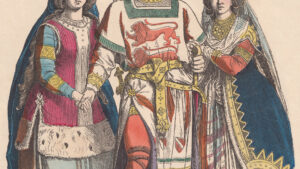Just over 30 years ago, the Alpha course was launched internationally out of the Holy Trinity Brompton church in London. The classes, which explained the basics of Christianity, caught on immediately. Ten years in, the course was annually reaching more than a million people around the globe.
“Demand for Alpha was insatiable,” wrote historian Andrew Atherstone in Repackaging Christianity: Alpha and the Building of a Global Brand. The organization grew to include marriage seminars, prison workshops, and leadership conferences.
Attendance peaked around 2012, then stabilized to a million attendees a year—with a brief jump during COVID-19. Since its inception, Alpha has opened the door for thousands of churches to evangelize their neighbors. The classes have reached nearly 29 million people in about 70 countries.
The person most responsible for this growth is a British Anglican priest named Nicky Gumbel. But Alpha’s story didn’t start there. It began 16 years earlier, with an assistant pastor named Charles Marnham.
The thing is, Marnham wasn’t supposed to be a minister. He was planning to be a lawyer, like his dad. He even worked his way through an entire education at Cambridge, graduating with a law degree.
In 1973, he was finishing up his time in Cambridge when a pastor suggested he go into the ministry instead. It wouldn’t be a popular choice with his parents, who weren’t churchgoers. His dad would be especially disappointed to hear of the change. Marnham would have to give up his planned professional training course and start theological training. And this time, he’d have to pay for it himself.
What should he do?
“I don’t often tell this story, because I don’t recommend what I did,” Marnham said. “I was quite a new Christian. And I said, ‘Lord, if you want me to do this, which is way beyond my comfort zone, you’re going to have to show me. I think my friend Charles Wilson has got to become a Christian.’”
To make it even harder, he threw in Wilson’s fiancée—“And Julia does too.”
Marnham and Wilson: The Beginning
If you grew up in Britain in the 1960s, your parents almost certainly participated in the war effort. Marnham’s father had been at Dunkirk and D-Day; his mother had been an ambulance driver. Wilson’s dad had been a paratrooper and fought in the battle of Arnhem. Julia’s mother worked for Bletchley Park, where German messages were decoded, while Julia’s dad had been imprisoned for three and a half years in a Japanese POW camp.
“We believe he lost his faith in the camp,” Wilson said of Julia’s dad. “A lot of people did, during the war. They just couldn’t believe there was a God.”

Marnham’s father might have been another one. “He took us to church as children, and he was a very moral and upright man,” Marnham said. “But I think the resurrection and so on seemed to him wishful thinking when faced with the hard realities of life.”
After the war, these men and women didn’t all go back to church, and attendance across the country began to fall. Their children would kick off a growing trend to claim no religion at all.
One of them was Marnham, a reserved and serious child. He loved to read, finished his homework on time, and knew the answers when the teachers called on him.
When he was 13 years old, at boarding school, he met the talkative and outgoing Wilson—who also loved to read but didn’t always finish his homework. Wilson was happy, constantly moving, and eager to share in class even if he didn’t know the answers.
The two bonded the way opposites do, admiring each other’s strengths and filling in each other’s weaknesses. Both played brass instruments and liked orchestral music. They started together in the same class, but Wilson was far less motivated to study, and his grades ended up “rubbish,” he said.
After boarding school, he headed to business school. Meanwhile, Marnham enrolled at Cambridge, one of the best universities in the U.K.
But something was bothering him.
Marnham: A Proper Conversion
“I knew I was a believer, but there was something missing,” Marnham said. “Eventually, I was recommended to go and talk to a Church of England minister about it.”
Over six sessions, the minister put the pieces of Christianity together for him.
“I hadn’t understood substitutionary atonement,” Marnham said. “I mean, it’s one thing to say Jesus died for the sins of the world. But it’s quite another to say that he died for you.”
The minister told Marnham to read John Stott’s Basic Christianity, which he obediently did.
“I prayed the prayer, as John Stott would recommend,” Marnham said. “There were no shining lights or anything, but clearly, something had happened. I discovered God was real and personal.”
He wrote Wilson a letter, telling him what had happened.
Hmm, Wilson thought. That’s the kind of thing a proper chap like Charles would do.
Wilson: Loving Julia
At business school, Wilson was also busy—not studying, but starting a music society with a friend. About 15 students showed up at their first meeting.
From the front where he was speaking, Wilson caught sight of a girl sitting on a desk at the back of the room. “When I went home on the bus that night, I could think of nothing but this beautiful woman who looked incredibly serious,” he said.

She didn’t feel the same attraction. When he asked her out, climbing over a dozen students in the crowded library to do so, she told him, “No, thank you.”
The next time he asked, she said, “Maybe some other time.”
The third time, she said, “I’m not going out with you on your own. But I’ll go if we go out with some others.”
Wilson was thrilled. Over Christmas break, he grabbed Marnham and another girl to round out a double date to the opera. At the end of the night, Wilson exuberantly made his way home, completely forgetting his manners. It was Marnham who walked Julia home.
But it was Wilson who wouldn’t give up. Eventually, his persistence won her over, and they began dating. Four years later, both had finished school and landed jobs—and they were still dating.
“My dad got fed up with Charles motoring around with intent but not actually doing anything about it,” Julia said. “He said he was going to send me abroad to finishing school.”
Quickly, Wilson proposed.
Marnham: Law or Ministry
By now, Marnham had finished his formal legal education at Cambridge and was studying at The College of Law in Guildford for his professional legal qualification.
“I hated the law, I’m afraid,” he said. “Just before I left Cambridge, the minister who had helped me find Christ said he thought I ought to consider the possibility of ordination.”
That was appealing, except for all the reasons it wasn’t—he’d have to restart his professional training, this time as a minister, without his parents’ approval or their financial support.
“I was on the horns of a dilemma,” he said. “I had a list of things that had to be resolved. But the real one was ‘Is God calling me or not?’ That was the heart of the problem.”
So he laid his fleece before the Lord—if this is your will, Charles Wilson has to become a Christian. Julia too.
Wilson: ‘Hit by God’
In the months before his wedding, Wilson was working for a movie theater company. With the invention of TVs and VCRs, cinema admission was plummeting, and they needed another use for their huge buildings. Wilson and a colleague began turning some of them into squash clubs and disco nightclubs.

They were doing well—they’d opened their first clubs, given a contract to their first staff member, and received the promise of half a million pounds in backing from a major brewer.
“Then I was told there had to be a pause,” Wilson said. That employee he’d just hired? He’d have to fire him.
“I was really upset,” Wilson said. “I wasn’t a Christian, but I knew that was not the right way to treat people.”
Grieved and furious, he picked up the book Marnham had given him a few weeks before—Stott’s Basic Christianity. He skipped the first eight chapters, heading to the back where Stott explains how to respond to Christ’s death. As Wilson read, he pictured in his mind the mural in his school chapel of Abraham and Isaac, Abraham’s arm raised to kill his child.
“I saw this was the death I deserved,” said Wilson, who still cries when he talks about it. “I saw that Jesus saved me from all of that. . . . I got hit by God that night.”
The next morning, he called Marnham, who told him to call a respected London rector named Dick Lucas. Lucas invited him to come over in a few weeks.
“I can’t wait that long,” Wilson told him.
So Lucas said he could come later that evening. He asked Wilson a pile of questions: Who is Jesus? Why did he need to die on the cross? What is sin? What is a Christian? How does anyone get to heaven?
“I was a brash young marketing guy, and I invented answers that were complete rubbish,” said Wilson, having skipped the majority of Basic Christianity. “After about 20 minutes, he stood up and said, ‘Well, Mr. Wilson, it’s not what you think that matters. It’s what God says.’”
Lucas gave Wilson a Bible, and for the next half an hour, he explained the gospel from Genesis to Revelation.
Toward the end of their time, Wilson said he was getting married in nine days. Lucas gave him a tract for Julia but cautioned him to be careful.
“Don’t push it down her throat,” said Lucas, who picked up on Wilson’s irrepressible enthusiasm. “In fact, I’m not sure you should even give this to her on your honeymoon.”
Wilson: Julia Too
Lucas was too late. Earlier that day, Wilson had called Julia at work. In a flurry of excited, incoherent words, he’d told her everything.

“It was a bit like being in the middle of a whirlwind, honestly,” she said. She gathered that he’d seen some kind of vision of Abraham, that he was a Christian, and that he was planning to quit his job and become a minister. By the time she got off the phone, she was a wreck.
“I went in to see my boss in a flood of tears,” she said. “I was completely confused.”
Give it a little time, her boss reassured her. Things will settle down.
But she didn’t have any time, and nothing settled down. Ignoring Lucas’s caution, Wilson met Julia the following night. He explained his conversion again, this time in person.
“I knew—it must have been the Holy Spirit—that I couldn’t get married to him unless I was a Christian too,” she remembered. He handed her the booklet from Lucas called How to Become a Christian. “I read it through and prayed the prayer at the end.”
That Sunday, they went to church together, and she felt as if the words in the Bible were standing out to her in 3D.
Julia, too, had been saved.
Wilson: Aftermath
The following Friday, Wilson quit his job. The next day, he married Julia.
“Making the vows before God meant something I hadn’t been expecting,” she said.

After their honeymoon, she went back to work at the Bank of England while Wilson read Christian books and thought about what he should do with his life.
“After three or four weeks, Dick Lucas caught wind of this,” Wilson said. “He said, ‘Charles, it’s not good for you to just be sitting at home thinking great thoughts. You need to go get a job.’”
So Wilson went to work—in construction, in a factory, driving a delivery truck. He went to law school and spent a few decades as a lawyer—for several years, he ran the U.K.’s Lawyers’ Christian Fellowship as general secretary. Then he started a business doing commercial debt recovery.
The Wilsons have been just as energetic in serving the church—for the last five decades, they’ve volunteered, given generously, and attended services faithfully with their four kids. All of their children and grandchildren are walking with the Lord.
The oldest, Andrew, is now a teaching pastor at King’s Church London. But his work is bigger than that—over the last 16 years, he’s published more than a dozen books, spoken at multiple conferences (including TGC23), and released a podcast with Glen Scrivener.

“Andrew is one of the most insightful young Bible teachers and cultural critics I know,” said Collin Hansen, executive director for The Keller Center for Cultural Apologetics. “He models the kind of humble, joyful leaders we hope to raise up at The Keller Center.”
“He’s a very interesting and original thinker,” Marnham said. “It is great that his wonderful gift is recognised and being used.”
Marnham, by the way, is Andrew Wilson’s godfather.
Marnham: Aftermath
After Wilson and Julia’s wedding, Marnham started seminary.
“There was absolutely no way to avoid it,” he said with a chuckle. “If it had been just Charles coming to faith, I could have said that was just luck. But both of them?”
Three years later, he had a theology qualification and a job as an assistant minister at an Anglican church in London called Holy Trinity Brompton.
In his new congregation, a young trainee lawyer was asking for a class to disciple people who were new to the faith. Like Marnham, Tricia Algeo had become a Christian at her university. Afterward, she worked for a few years with InterVarsity Christian Fellowship and a year with the Billy Graham Evangelistic Association. Over those years, she had the benefit of help from older saints.
“I’m getting a new assistant,” the pastor told her. “Why don’t you get together and work on this?”

Marnham and Algeo started with a breakfast meeting one Saturday. “We eventually worked out a six-week course,” Marnham said. It was fairly simple: the two of them would take turns giving a talk about topics such as how to know if you’re saved, how to read the Bible, and how to understand God, Jesus, and the Holy Spirit. Then they’d split the participants into groups and discuss.
Algeo suggested the name “Alpha” because it was aimed at those beginning a new life in Christ.
It worked. At the first meeting, held at Marnham’s apartment above the church hall in November 1977, about six people came. Within two years, there were so many discussion groups squeezed into Marnham’s apartment that his roommate couldn’t even get in to use the bathroom.
“What we discovered very early on was that people were coming who had made a commitment to Christ, but it also drew people who had not made a commitment,” Marnham said. He made sure to give lots of opportunities for questions.
“I think giving people that permission was a huge relief, because it’s embarrassing, particularly in English circles, if there are spiritual things you have to admit you don’t understand,” he said. “Also, I felt when I was struggling for faith that Christians were answering questions I wasn’t asking. And they weren’t answering the questions I was asking.”
Two years later, Marnham married Algeo and eventually took the pulpit at his own church in the north of England. He left behind the course, which future leaders would continue to refine as it grew. By 2022, it had influenced millions of people around the globe, helped by a serious boost from COVID-19. In that year alone, more than 400,000 people participated in more than 13,000 courses.
Marnham knows why it grew so fast and so well: “That’s God, isn’t it?”
Marnham: Local Church Leader with International Links
Marnham didn’t start any other massive global initiatives. For the next 35 years, he preached sermons, counseled people, and trained assistant pastors in two congregations.

But like many pastors, his work has spread far beyond the local church walls. His second congregation, located in London, welcomed members from as many as 16 countries, including the United States, Mongolia, and Eritrea. Marnham worked with Anglican churches in Tanzania, and since 2002, has been a trustee and board member of the Emmanuel Foundation. Through that organization, he’s worked both as consulting editor of the online Kairos Journal and as a senior adviser to BibleMesh, which offers online theological education.
“There have been good moments and really bad moments, as any minister will tell you,” he said. Though he’d never recommend laying out a crazy challenge to God the way he did, he doesn’t regret his career change for a moment.
“God knew me, and he knew what was best for me,” Marnham said. “I’ve been a church minister for 42 years. In the way that God works, it was marvelous. . . . It has been a huge privilege.”
Try Before You Buy: FREE Sample of TGC’s New Advent Devotional
 Choosing the right Advent daily devotional can be tough when there are so many options. We want to make it easier for you by giving you a FREE sample of TGC’s brand-new Advent devotional today.
Choosing the right Advent daily devotional can be tough when there are so many options. We want to make it easier for you by giving you a FREE sample of TGC’s brand-new Advent devotional today.
Unto Us is designed to help you ponder the many meanings of this season. Written by TGC staff, it offers daily Scripture readings, reflections, and questions to ponder. We’ll send you a free sample of the first five days so you can try it out before purchasing it for yourself or your church.

































